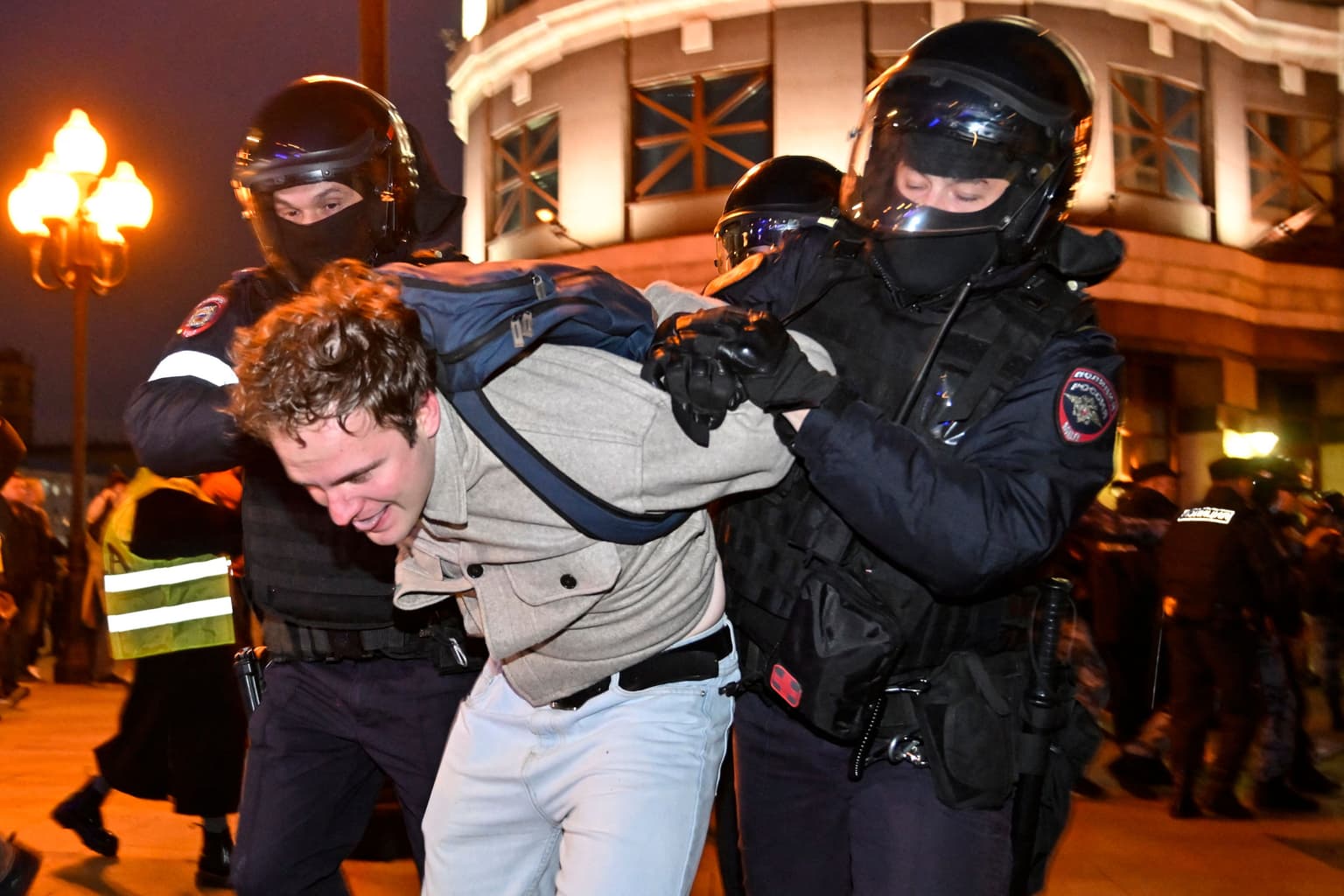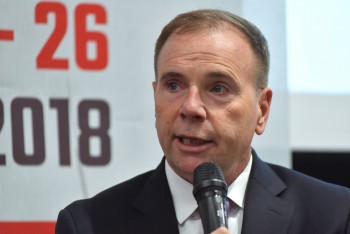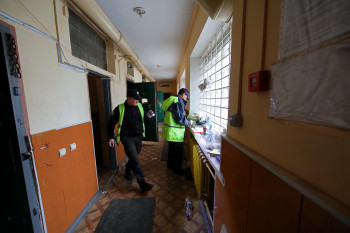Russia’s sham referendums, mobilization, nuclear threats: What it all means

Humiliated on the battlefield, the Kremlin now wants to quickly annex occupied Ukrainian territories and add them to the Russian Federation.
Russian proxies in the occupied parts of Luhansk, Donetsk, Kherson and Zaporizhzhia oblasts have announced that between Sept. 23 and 27, they will rush sham “referendums” on these areas joining Russia. Like the invasion itself, this is a violation of international law.
At the same time, Russian president Vladimir Putin on Sept. 21 announced a “partial mobilization” to send 300,000 reservists into Ukraine to "protect the sovereignty, security and territorial integrity of Russia."
Both steps go hand in hand, allowing Russia to claim, at least to its own citizens, that it’s protecting its own territory from the West. Ukraine and Western countries have already rejected the legitimacy of these referendums. It’s unlikely that Russia will bother to try to make them look legitimate, given their extremely abbreviated timeframe.
“Russia has been and remains an aggressor illegally occupying parts of Ukrainian land,” tweeted Ukraine’s foreign minister Dmytro Kuleba. “Ukraine has every right to liberate its territories and will keep liberating them whatever Russia has to say.”
President Volodymyr Zelensky told German newspaper BILD that Putin's move is not news to him and that Russia's been conducting a partial mobilization all through the past month.
In terms of the conventional war, the Kremlin’s actions change little, at least in the short term. Russia is already struggling with massive material and personnel shortages. It could take months for mobilized reservists to even make it to Ukraine, where they’ll be dogged by low morale, bad commanders and poor equipment in the middle of winter. Russia’s also dealing with a large number of “refuseniks,” soldiers who don’t want to fight in Ukraine.
After its smashing victory in Kharkiv Oblast, Ukraine now controls the tempo of the war and is striking at Russian forces in Kherson, Donetsk and Luhansk Oblasts. Ukraine’s top officials made it clear that no referendum will make Ukraine give up on its goals of liberating all of its territory, including the Donbas and Crimea.
However, by claiming that Ukraine is attacking or occupying its land, Russia may fall back on its nuclear doctrine to justify tactical nuclear strikes against Ukraine. Experts disagree on the likelihood of preemptive nuclear strikes. In his speech on Sept. 21, Putin overtly threatened the use of nukes, while falsely accusing Ukraine’s western allies of doing the same.
“In the event of a threat to the territorial integrity of our country and to defend Russia and our people, we will certainly make use of all weapon systems available to us. This is not a bluff,” he said. “Those who are using nuclear blackmail against us should know that the wind rose can turn around.”
In reality, it’s Russia that has been repeatedly using nuclear blackmail, both through hinting at its nuclear arsenal and endangering the reactors of the Zaporizhia Nuclear Plant, which its forces occupy since March.
Sudden reversal
On Sept. 20, Russian proxies that occupy a large portion of Ukraine’s Luhansk and Donetsk Oblasts ordered a vote to join Russia. Soon after, the Russian puppets in Kherson and Zaporizhzhia oblasts joined in.
The desire to hold referendums is a recent change linked to Ukraine’s recent successful counteroffensive, Russian independent publication Meduza reported, citing unnamed sources in the Kremlin. According to them, until recently, Moscow intended to put referendums on hold indefinitely. Meduza’s sources said that Russian agents responsible for holding sham referendums in Kharkiv and Zaporizhzhia Oblast even went back to Russia.
Several weeks ago, Ukrainian journalist Kostiantyn Ryzhenko, who covers Kherson Oblast, had a similar assessment of the situation for the Kyiv Independent, saying it seemed the situation in Kherson was too unstable to bother with a sham vote. If an area was declared independent from Ukraine and then reconquered by Kyiv, it would raise some difficult questions.
But now, that’s precisely what Russia seems to be trying to accomplish. By claiming occupied territories as its own sovereign soil, Moscow is giving itself the license to ramp up its threats against Kyiv and the international partners helping Ukraine’s liberation drive.
The change was likely driven by the Russian government’s hysterical pro-war minority, which has been infuriated by setbacks in Kharkiv Oblast. Putin has to keep this faction appeased, said Russian sociologist Greg Yudin. But he also has to mind what Yudin calls the passive majority, citizens who don’t mind the war as long as their own lives don’t get too inconvenient.
“Putin has to maneuver between these two groups and I think he will still try to do that in the coming days,” Yudin told the Kyiv Independent. Hence the language of “partial” mobilization. If he were to frame the invasion as all-out war, “that would definitely be an assault on the passive majority.”
The decision may also have been triggered by the growing anxiety from Russian proxies in occupied territories.
In his speech, Putin characteristically accused Ukrainian forces of the same atrocities his forces have engaged in. Recently, hundreds of bodies of Ukrainian military and civilians were found near the liberated city of Izium, many of them showing signs of extreme torture inflicted by Russian occupiers.

Low-effort forgeries
Sham referendums aren’t a new method for Russia. In 2014, during its initial invasion, Russia used them first in Crimea, then in the occupied parts of Donetsk and Luhansk oblasts.
The one in Crimea resulted in Russia proclaiming that 97% of voters supported secession and “reuniting” with Russia, which Moscow used as a pretext to immediately annex the peninsula.
In Donetsk and Luhansk oblasts, fake referendums were organized in May 2014, where the residents were supposedly asked if they want to secede from Ukraine; there was no question about Russia. At the time, Russia’s official position was to pretend that it had nothing to do with the fighting in eastern Ukraine, even as its regular army invaded the region in plain sight.
Russia’s methods could be seen when, shortly before the “referendums” in eastern Ukraine in 2014, the Security Service of Ukraine (SBU) released an audio recording of what it said was a phone conversation between Russian ultranationalist Alexander Barkashov and the head of a Donbas separatist group, Dmytro Boitsov.
“Donetsk won’t hold out. If we aren’t helped… if Russia doesn’t go in, we are f*cked,” said the voice that SBU claimed is Boitsov’s. “I’m canceling the referendum on this date because it won’t happen.”
“Dima, Dima, you can’t cancel it, no way. It’s going to come out like you’re scared,” the Barkashov voice replied, adding, “Just write whatever you want. Write something like 99 percent… well, not 99 percent… Let's say 89 percent voted for the Donetsk Republic. What are you going to walk around and collect papers? Are you f*cked in the head?”
The proxies then released “results” claiming that 89% of the population voted to secede.
Yudin expects a similar level of effort to go into the upcoming “votes” this weekend. Serhiy Khlan, a former adviser to the Kherson Oblast governor, expects that "they will film a video of people supposedly going house to house but no one will actually go around collecting signatures."
Announcing the supposed referendum just days in advance would make it organizationally challenging to conduct on a wide scale. Some areas, like occupied Kherson, have partisan activity, with regular news of alleged Russian collaborators being assassinated.
According to Meduza, the vote may be electronic, which would be very easy to manipulate from Russia.
Who will be mobilized
The mobilization decree Putin signed into effect on Sept. 21 was vague — it mentioned that Russians called into service will have contract status until the end of the mobilization, which doesn't have an exact date. The document doesn't say what type of people the military is looking for, only lists possible health and work exemptions. Service members can't leave until the armed forces say they can.
Speaking after Putin, Russian Defense Minister Sergei Shoigu said that “partial mobilization” will deploy 300,000 more people who have military experience and special training.
Alina Frolova, a defense expert with the Ukrainian think tank Center for Defense Strategies, said that for Ukraine, referendums and mobilization means very little. Russia’s military is currently struggling and simply calling up reservists is not going to make its problems go away.
“There are many people but little point,” she told the Kyiv Independent. “They are unprepared, under-equipped people. It does not change the operation.”
Adding more manpower to Russia’s military force will not solve their poor military leadership, low morale or equipment troubles.
Multiple videos and reports from the front line show that a lot of Russian equipment is of bad quality. Vera Mironova, an American researcher who was embedded with Ukrainian forces in Donbas, said the fallen Russians' non-weapon equipment was woefully inadequate. This included body armor, medical supplies, tourniquets and food rations.
In Kharkiv, the Russian forces lost a huge number of tanks, infantry fighting vehicles, self-propelled artillery, trucks, and specialized vehicles such as mobile command and control units, likely containing valuable intelligence. They also lost massive stockpiles of ammunition, mines, rockets and other weapons that Ukraine is incorporating into its arsenal.
Still, Michael Kofman, the director of Russian studies at think-tank CNA, cautioned against dismissing the mobilization entirely. While it comes with significant political risks and downsides, it could extend Russia's ability to sustain this war.
Nuclear blackmail and international response
The fake referendums open up the excuse to extend a nuclear shield over these territories, Yudin said.
Frolova said something similar. Tactical nukes, per Russian doctrine, can be used if there's a threat to Russian statehood. "If they take some parts of Ukraine and make it into their territory, they can ramp up the nuclear blackmail," she said.
Retired U.S. Lieutenant General Ben Hodges recently told the Kyiv Independent that he doubts Russia would use nuclear weapons because there's no advantage in doing so — "it won't, all of a sudden, change the conflict because they have nothing with which to exploit." Secondly, it would mean the direct, immediate involvement of the United States, in his opinion.
White House spokesman Jake Sullivan said the U.S. would never recognize the Russian claims. He said the referendums are a direct violation of Ukrainian sovereignty, which Washington rejects “unequivocally.” Antony Blinken, the U.S. secretary of state, spoke of Putin’s “utter contempt and disdain” for the United Nations, its General Assembly and its charter.
British and European Union officials also blasted Putin’s message. EU spokesman Peter Stano told reporters that Putin is making a "very dangerous nuclear gamble" and must "stop such reckless behavior." He added that the "sham, illegal referenda" will not be recognized. European Council president Charles Michel said the EU will be "steadfast" in supporting Ukraine.
British Foreign Office minister Gillian Keegan said that Putin's threats must be taken "very seriously."
Before the referendums were announced, Indian Prime Minister Narendra Modi told Putin "today's era is not an era of war." After Putin met with Chinese President Xi Jinping, the Russian dictator acknowledged that Beijing has "questions and concerns" about the war — China later called for a “negotiated solution”.
When a reporter asked U.S. President Joe Biden what he would say to Putin about the use of nuclear weapons, Biden said: “Don’t. Don’t. Don’t. It would change the face of war unlike anything since World War II.”











